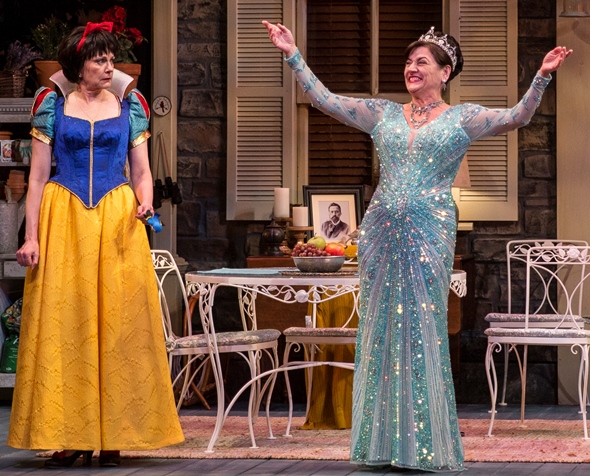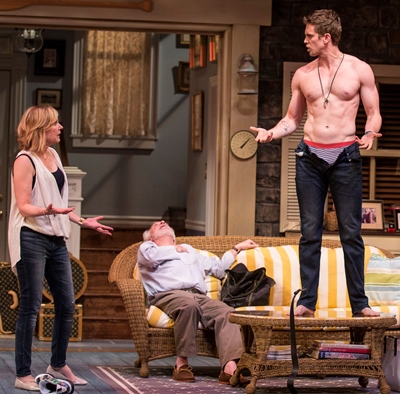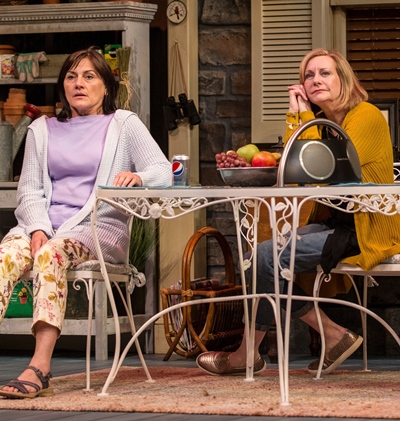‘Vanya and Sonia and Masha and Spike’: Lighting up Chekhov with laughter at Goodman
 Review: “Vanya and Sonia and Masha and Spike” by Christopher Durang, at the Goodman Theatre. Extended through Aug. 2. ★★★★★
Review: “Vanya and Sonia and Masha and Spike” by Christopher Durang, at the Goodman Theatre. Extended through Aug. 2. ★★★★★
By Lawrence B. Johnson
I hate going here, I really do, because it’s going to sound like home cooking, but the hysterical truth is – and everything about this is hysterical – that the Goodman Theatre romp through Christopher Durang’s “Vanya and Sonia and Masha and Spike” roundly eclipses the production I saw last season in New York. Directed by Steve Scott, this show is so smart and tight, so killingly funny, that seeing it just once may not be possible.
 Three of the titular characters are drawn (and dare I say quartered) from the plays of Chekhov. And let’s be clear up front: Spike is not one of them. Vanya and Sonia and Masha are grown siblings, named by their late parents after characters in the great Chekhov plays, the first two from “Uncle Vanya,” the last from “Three Sisters.” Motifs from both are woven into the present fabric as are bits from the Russian playwright’s two other most famous works, “The Cherry Orchard” and “The Seagull.”
Three of the titular characters are drawn (and dare I say quartered) from the plays of Chekhov. And let’s be clear up front: Spike is not one of them. Vanya and Sonia and Masha are grown siblings, named by their late parents after characters in the great Chekhov plays, the first two from “Uncle Vanya,” the last from “Three Sisters.” Motifs from both are woven into the present fabric as are bits from the Russian playwright’s two other most famous works, “The Cherry Orchard” and “The Seagull.”
I suppose “Vanya and Sonia and Masha and Spike” would be funny for viewers without a clue about Chekhov. But trust me, the greater one’s familiarity with his existential gloom, the more keenly one savors the meltdown madness in Durang’s freewheeling contemporary spin.
Like their namesakes in “Uncle Vanya,” middle-aged, unmarried (now gay) Vanya (Ross Lehman) and his spinster sister Sonia (Janet Ulrich Brooks) are living out their humdrum lives in a home owned by a wealthy, celebrated relative – in this case, their sister, the movie star Masha (Mary Beth Fisher). But here, Masha is more like the stage actress Arkadina in “The Seagull,” sweeping in for a visit, full of herself and accompanied by – well, not Arkadina’s lionized author-lover, but instead the young stud Spike (Jordan Brown), a wannabe actor with the body of Adonis who can flex his pectorals individually and likes to parade in his underwear.
 What follows is a Chekhovian mashup, a sort of pinball game of caroming references, throwaway lines, fleeting allusions. One minute, despairing Sonia is weary of this large house – charmingly wrought by set designer Charlie Corcoran – that she and Vanya must maintain (albeit with Masha’s money), and the next minute she’s lost in dreamy contemplation of their cherry orchard. What cherry orchard? Vanya asks. It’s like nine trees. That’s not an orchard. It’s a small orchard, Sonia agrees, but she loves it.
What follows is a Chekhovian mashup, a sort of pinball game of caroming references, throwaway lines, fleeting allusions. One minute, despairing Sonia is weary of this large house – charmingly wrought by set designer Charlie Corcoran – that she and Vanya must maintain (albeit with Masha’s money), and the next minute she’s lost in dreamy contemplation of their cherry orchard. What cherry orchard? Vanya asks. It’s like nine trees. That’s not an orchard. It’s a small orchard, Sonia agrees, but she loves it.
Brooks’ pining, simpering, simmering Sonia — “I’m like a wild turkey” – is the soul of self-loathing. Even in a constantly funny play, Brooks’ end of a telephone conversation with a guy she’s just met at a party who wants to take this woeful woman, this wild turkey, to lunch ratchets the comedy up several notches.
The party, a costume affair that takes place off-stage, is the play’s fulcrum. Upon her arrival, Masha announces that she’s been invited to the party and plans to go as Snow White, and therefore has brought Dwarf costumes for Vanya and Sonia. (Spike will go as Prince Charming.) But Sonia rejects subjugation as a Dwarf and comes up with her own sparkly sequined look as the Evil Queen – and bolsters that by adding an incredible imitation of Maggie Smith’s voice.
 Masha does not have a good time. But even Masha’s good times have grown paper thin. Fisher is more than merely funny in her outrageously perfect comedy; she is human and touching. Spike, hammed to the hilt by the beaming Brown, is Masha’s lie to herself, her denial that she could be his mom – that she’s no longer of the generation of this exceedingly healthy young man.
Masha does not have a good time. But even Masha’s good times have grown paper thin. Fisher is more than merely funny in her outrageously perfect comedy; she is human and touching. Spike, hammed to the hilt by the beaming Brown, is Masha’s lie to herself, her denial that she could be his mom – that she’s no longer of the generation of this exceedingly healthy young man.
But reality’s mirror pops up in the cute teenage form of Nina (Rebecca Buller), who’s visiting next door. Nina wrangles an invitation to the costume party as the second Dwarf. This is not going to be Masha’s night.
The first Dwarf is Vanya – Vanya the benign, the nearly invisible. Or so it seems until Nina discovers he has written a play and coaxes him into organizing a group reading. It’s a highly experimental play, like the one written by Arkadina’s son Konstantin in “The Seagull.” The reading, however, leads Vanya down several tangential pathways to an impassioned monologue about the loss of community and things shared as cell phones and the Internet have made monastics of us all. Lehman’s delivery of this remarkable speech builds from something like treacly nostalgia to a feverish lament for the sacrifice of our commonality, the diminution of our humanity. No one was laughing at the end of that, or if they were you couldn’t hear it for the roaring ovation.
 For good measure, Durang has thrown in the visionary Cassandra (E. Faye Butler) from Greek tragedy, though translated into a housekeeper with a penchant for voodoo. Butler’s wry Cassandra not only sees all but deftly pushes events along with a long needle and a little doll likeness of Masha dressed as Snow White. It may be an old comedy schtick, but it’s robustly funny all the same.
For good measure, Durang has thrown in the visionary Cassandra (E. Faye Butler) from Greek tragedy, though translated into a housekeeper with a penchant for voodoo. Butler’s wry Cassandra not only sees all but deftly pushes events along with a long needle and a little doll likeness of Masha dressed as Snow White. It may be an old comedy schtick, but it’s robustly funny all the same.
Perhaps, after all, you needn’t be a card-carrying Chekhovian to love “Vanya and Sonia and Masha and Spike.” True, the human foibles on display are the ones Chekhov observed. But where the sober Russian framed our frailty in heavy clouds, Durang encircles them in a big smiley face. On the Goodman’s stage, it’s a knowing smirk, and it begets teary laughter.
Related Link:
- Performance location, dates and times: Details at TheatreinChicago.com
Tags: Charlie Corcoran, Christopher Durang, E. Faye Butler, Goodman Theatre, Janet Ulrich Brooks, Jordan Brown, Mary Beth Fisher, Rebecca Buller, Ross Lehman, Steve Scott, Vanya and Sonia and Masha and Spike

